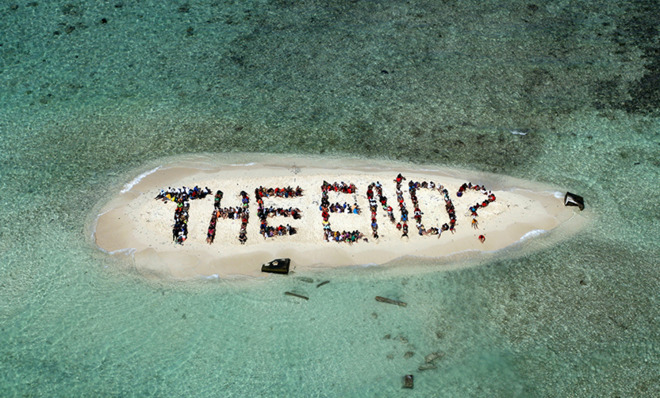Why the fight against climate change needs more win-win solutions
The new report from the IPCC highlights how self-interest could end up saving us all


A free daily email with the biggest news stories of the day – and the best features from TheWeek.com
You are now subscribed
Your newsletter sign-up was successful
This weekend, the United Nations Intergovernmental Panel on Climate Change released its latest report, which amounts to the starkest warning yet that the world is on unsustainable path toward accelerated climate change. But in a survey filled with dour news, there was evidence that governments have hit on win-win solutions that can overcome the shortsighted political self-interest that has dogged the issue for decades.
The IPCC's Synthesis Report aims to summarize and contextualize a wide body of scientific work in language that policymakers can understand, in an effort to compel them to act in a way commensurate with the totality of the risk before them. It details the radical changes necessary to stave off a calamitous future of resource deprivation and extreme weather risk. If the world does not put itself on a path to zero-carbon by 2100, the probability is extremely high that we will not avoid the worst effects of global warming.
The topline findings underscore both the unprecedented nature of the warming we have experienced so far, as well as the conclusion, beyond a shadow of a doubt, that humans are responsible for it. "The period from 1983 to 2012 was likely the warmest 30-year period of the last 1400 years in the Northern Hemisphere," according to the IPCC. The blame is laid squarely on the energy source that served as a foundation for economic growth in the modern era: "Emissions of CO2 from fossil fuel combustion and industrial processes contributed about 78 percent of the total greenhouse gas emissions increase from 1970 to 2010."
The Week
Escape your echo chamber. Get the facts behind the news, plus analysis from multiple perspectives.

Sign up for The Week's Free Newsletters
From our morning news briefing to a weekly Good News Newsletter, get the best of The Week delivered directly to your inbox.
From our morning news briefing to a weekly Good News Newsletter, get the best of The Week delivered directly to your inbox.
There is no conceivable way, in the estimation of the scientific community, that we would be seeing such warming patterns without the actions of human beings.
The report also highlights climate change's profound geopolitical risk. While animal and plant species will suffer irreversible, lethal effects from radical changes in habitat, it is the effect on people that is ultimately most important — and no less dangerous. For the developing world in particular, the effects will be difficult to adapt to, and threaten to undermine the impressive record of economic growth and poverty alleviation experienced over the past 30 years.
The effect of such setbacks could be quite dire in the eyes of the IPCC: "Climate change can indirectly increase risks of violent conflicts by amplifying well-documented drivers of these conflicts such as poverty and economic shocks." For those who would doubt that climate change is a national security concern, this report should be a wake-up call.
Will another report from the United Nations actually change anything? The international community will have an opportunity to demonstrate that in Paris in 2015, when world leaders will meet to craft a follow-on agreement to the Kyoto Protocol. While countries have made impressive strides in goal-setting for emissions reductions, the pace of those reductions will not likely align with the low- to zero-carbon path the IPCC concludes is necessary to minimize risk. For example, the aggressive emissions reduction target announced by the European Union last week, while among the strongest plans yet proposed, may still not be ambitious enough.
A free daily email with the biggest news stories of the day – and the best features from TheWeek.com
The report's authors blame "inertia" for a lack of ambition when it comes to combating climate change, which is a polite and diplomatic way of pointing out a variety of obstacles: the vested interests of the fossil fuel industry and their political allies, as well as developing world countries that argue, not without merit, that their economic growth should be prioritized over emissions reductions.
This report does acknowledge that, in the short term, mitigation of climate change will pass down costs to consumers, even if they are balanced by avoiding the worst effects of future warming. Importantly, there are also some immediate benefits: energy security derived from reducing usage of imported fuel sources, as well as public health benefits from reducing particulate pollution.
The latter argument has been aggressively used by the U.S. Environmental Protection Agency to justify the cost-effectiveness of its new rules regarding existing power plants. It also should be an attractive rationale for the smog-choked cities of India and China, two of the developing world's biggest carbon emitters, and other countries that have resisted calls for reducing pollution in the name of poverty alleviation.
Perhaps the key obstacle to greater international cooperation has been money. The developing world has long argued that the developed world needs to pony up some financial aid, due to their historical responsibility in emitting carbon into the atmosphere. To date, pledged contributions to the Green Climate Fund have lagged behind what was promised in previous years. A concrete pledge by the United States to contribute to the fund, even a token amount, would go a long way to assuring the developing world that the developed world is committed to following through on their pledges.
It would also buttress bilateral partnerships with India and China, both a priority for the Obama administration, to say nothing of private sector investments in clean energy diffusion.
One of the goals for Paris, then, will be to follow through on these promises and identify methodologies for creating more of these win-win situations, where climate change mitigation is paired with other immediate benefits, in a way which can be embraced by the widest possible range of participating nations. If even that attempt fails, then this planet and the people living on it will be on the path toward an unimaginably dire and dangerous future.
Neil Bhatiya is a Policy Associate at The Century Foundation, where he works on issues related to U.S. foreign policy, with a specific focus on South Asia and climate change.
-
 What is the endgame in the DHS shutdown?
What is the endgame in the DHS shutdown?Today’s Big Question Democrats want to rein in ICE’s immigration crackdown
-
 ‘Poor time management isn’t just an inconvenience’
‘Poor time management isn’t just an inconvenience’Instant Opinion Opinion, comment and editorials of the day
-
 Bad Bunny’s Super Bowl: A win for unity
Bad Bunny’s Super Bowl: A win for unityFeature The global superstar's halftime show was a celebration for everyone to enjoy
